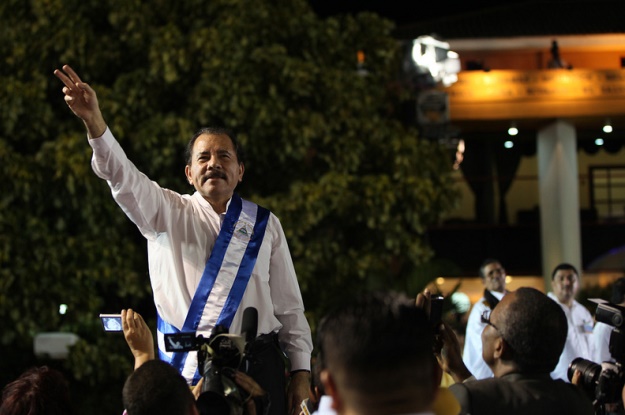It’s election season in Nicaragua, but a visitor to Managua could be forgiven for not noticing. No catchy political jingles blare from car radios, and the only campaign posters and billboards are the same as ever: the pink and baby blue offerings of the ruling Sandinista National Liberation Front (FSLN). Less than a month until the polls – and with left-leaning governments toppling around the region – the re-election of socialist President Daniel Ortega is the safest bet in Latin American politics.
“The opposition isn’t campaigning, our only option is to tell people not to vote,” Dora María Téllez, founder of the opposition Sandinista Renovation Movement (MRS) party, told AQ. “The election is a farce, a mega-fraude is taking place and we cannot legitimize it.”
Although he was always the favorite to win the November 6 vote, over the past four months Ortega has systematically put the result beyond doubt. In July, he banned 28 deputies of the Independent Liberal Party from running in the elections, including its leading presidential candidate, Eduardo Montealegre. In August, Ortega announced that international election observers would not be permitted at the polls, fuelling suspicions that the irregularities that marred elections in 2011 – when observers were prevented from accessing a number of voting stations – could worsen this time around.
The effects on Nicaraguan democracy could last well beyond the next election cycle. In August, Ortega chose his wife, Rosario Murillo, for the vice-presidential ticket. “They have created a dynastic dictatorship … We lived through this with the Somozas, it’s what we fought to put an end to” said Téllez, referring to the right-wing regime that dominated Nicaragua’s 20th century politics.
Ortega’s repression of dissent can seem petty or paranoid given his firm grip on power and enduring popularity. He won handsomely in the 2007 and 2011 elections and an August poll showed that two in three Nicaraguans intended to vote for him in November. But while Ortega’s political project looks as strong as ever, worsening economic prospects suggest it may be vulnerable in the long run.
Similar to Brazil’s former President Luiz Inácio Lula de Silva, Ortega has combined a relatively open economic policy with redistributive social spending that has kept both business elites and low-income voters happy. Over the last decade, a booming textile-for-export industry, new gold mines and plans for a trans-oceanic canal have stoked the economy, doubling GDP to $12.7 billion. While the MRS and others say that “neoliberalism” hasn’t resulted in a trickle down of jobs, the poverty rate dropped from 42.5 percent in 2009 to 30 percent in 2014 and unemployment fell from 8.2 percent to 6.8 percent over the same period. According to the 2016 Latinobarómetro study, 46 percent of Nicaraguans think the country is governed for the good of the people, the highest rate in Latin America.
But the economic conditions that allowed Ortega to play democrat, economic savior and friend to the poor are coming to an end. Across Latin America, the end of the commodity cycle and fat government revenues has created serious fiscal problems and stoked inflation, leading to the fall of “pink tide” governments in Argentina, Brazil and Peru.
Those economic headwinds are reaching Nicaraguan shores. Venezuela is cutting back cheap oil exports to the country as part of its Petrocaribe project and studies suggest the Central American nation has a $3.5 billion debt to Nicolás Maduro’s cash-strapped regime. The expected $50 billion investment in the proposed canal may never materialize given that its Chinese backer reportedly lost 80 percent of his wealth last year. By obtaining a two-thirds super majority in the coming elections, Ortega would be able to tackle tough economic times with little opposition.
“Recent developments aimed at undermining the political opposition are simply a continuation of Ortega’s ongoing efforts to consolidate his control over all aspects of Nicaraguan political life – the courts, military and police, and expulsion of non-Ortega loyalists from the FSLN,” Mike Allison, a political science professor at Scranton University, told AQ.
The private sector has reason to worry, according to Felix Maradiaga, an influential local entrepreneur. “Under Ortega foreign direct investment has grown, but the country has not attracted world class capital, mainly because of a lack of transparency in the business world,” Maradiaga told AQ. “Some local private sector groups reached working arrangements with the Sandinistas, thinking they would outlive the Ortega administration. However, he or his family are now looking to remain in power indefinitely and that is a cause for concern.”
In the short term, Ortega looks set to get his way. Appeals from international organizations to respect democratic principles met with little response until October 16, when the Nicaraguan government agreed to a “dialogue” with the Organization of American States – but Ortega looks unlikely to make concessions that would put his project at risk.
Still, the spectacular unpopularity of Maduro and Brazil’s impeached former President Dilma Rousseff provide recent examples of how charismatic leaders’ succession plans don’t always work out. And the FSLN’s popular support may not be as durable as it appears, especially if the economy falters seriously.
On a dirt road near the city of San Juan del Sur, Carlos González runs a small shop selling beers and gallo pinto to surfers. “That thing?” he says when questioned about the traditional red and black Sandinista flag that hangs from the roof. “All the stores have them. It doesn’t mean I support Daniel, it’s just better to keep one flying.”
—
Youkee is an independent journalist and analyst based in Bogotá. Follow him on Twitter: @matyoukee








